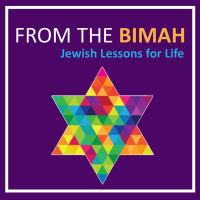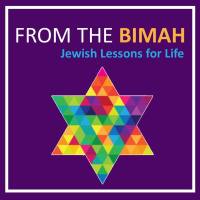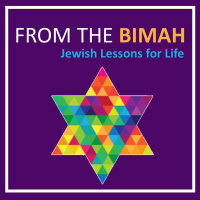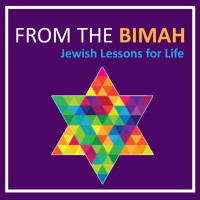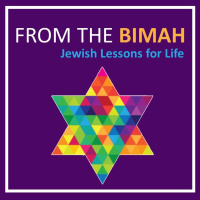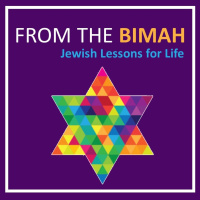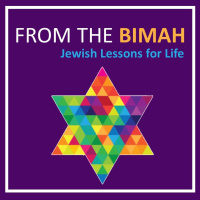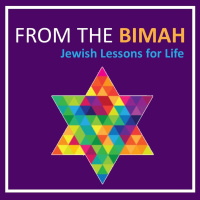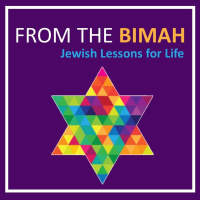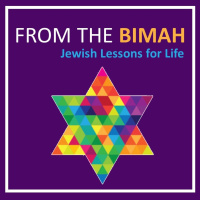Sinopsis
Bringing weekly Jewish insights into your life. Join Rabbi Wes Gardenswartz, Rabbi Michelle Robinson and Rav-Hazzan Aliza Berger of Temple Emanuel in Newton, MA as they share modern ancient wisdom.
Episodios
-
Talmud Class: Rabbi David Golinkin on Israel at War
18/11/2023 Duración: 56minThis is a Talmud class like no other for a moment like no other. One short story encapsulates the moment. There are tragically so many moments like it. On Sunday, Shira was speaking with her brother Ari and sister-in-law Tziporit who live in Jerusalem. They had just returned from the funeral of a close friend who was a member of their shul in Jerusalem. This man was 44. He had aged out of being required to do miluim. He could have taken a pass. He could have opted out. He is married and has five children. But he, and 360,000 others, believe that Israel’s very existence is at stake. This is Israel’s Second War of Independence. So, he volunteered to fight even though he did not have to fight. His life is about something larger than his life. He died in battle, leaving a widow, five fatherless children, and a grieving nation. My siblings had no words for their heartbreak. Funerals, shivas, sleepless nights (their children are in harm’s way) are how they are spending this war. How are Israelis living through
-
Shabbat Sermon: When Parents and Children Disagree About Israel
11/11/2023 Duración: 21minThis morning I want to tackle a question that is granular, sensitive, painful, common—and coming soon to a Thanksgiving table near you. What do we do when different generations in our family disagree, passionately, about Israel? This is not a new question. It is an old question. What is new is the urgency of the question in light of the massacre of October 7, and Israel’s ongoing response in the weeks since. If this war continues to be protracted, if both Gaza civilians and Israeli soldiers continue to die, the latent differences among the generations will only get exacerbated. Several families have come to see me asking how they should respond to views of their children that are very different from their own. My son told me that he attended a rally to pressure Israel into a ceasefire. My daughter told me that she has been calling our Senators to force Israel into a ceasefire. I can’t even believe it. What do I say? What do I do? What happens when these different views are expressed around the Th
-
Talmud Class: How Does This Chapter Compare?
11/11/2023 Duración: 47minAbout the daily stories of rising anti-Semitism, two questions. First question: How does this current chapter compare to previous chapters? The Haggadah contains the famous passage vehei she’amdah: This promise has stood us and our parents in good stead. For not only has one enemy stood over us to annihilate us. But in every generation enemies have stood over us to annihilate us. Yet the Holy One keeps the promise to save us from their hands. Take a look at the one-page rendering of Jewish history in the Haggadah entitled A Night to Remember. It is a timeline of Jew hatred. In what ways is the current chapter like previous chapters? In what ways is the current chapter unique? How would you compare this present moment to our long history of anti-Semitism? Second question: What should we do about it? What is the response of Elie Wiesel in Souls on Fire? What is the response of Dara Horn in People Love Dead Jews? How do Elie Wiesel’s and Dara Horn’s responses compare? What works for you as
-
-
Talmud Class: Moshe Dayan's Hard Words in 1956, Israel's "Gettysburg Address"
04/11/2023 Duración: 50minAll of us worry about the courageous soldiers of the IDF going into the alleys and tunnels of Gaza. It fills us all with deep dread. The ground invasion, and what it will mean to Israeli soldiers, has resurfaced a very important text in Israeli history, Moshe Dayan's brief remarks at the funeral of an officer named Roy Rotenberg who was murdered in 1956 patrolling the Israeli-Gaza border in the same area where more Israelis were murdered on October 7. Dayan's brief speech is called Israel's Gettysburg Address. In few words, he nails the reality of what it will take to keep a Jewish state alive. The words seem exhausting, depressing and all too true. They were true in 1956. They remain true today. Shavit tells the story of why the conflict which eventuated in death along the Gaza border in 1956 and again in 2023 will never be resolved, which will make Dayan's words the eternal cost of an eternal Jewish state.
-
Shabbat Sermon: Hope - What Poland’s Jewish Rebirth Means for the Jewish World with Jonathan Ornstein
31/10/2023 Duración: 10minOctober 28, 2023 Jonathan is the CEO of the JCC in Krakow Podland
-
Talmud Class: Do the Two Psalms We Say Every Morning and Every Evening (Psalms 121 and 130) Help?
28/10/2023 Duración: 46minElie Wiesel talked about madness descending on Europe in the 1930s. Cultured, urbane, sophisticated Germans who loved opera and philosophy, and who were nice to their dogs and cats, warmed to the Nazis. A similar madness is descending on American college campuses and universities today. It is madness because throngs of students feel that Israel is an apartheid regime; that it is morally always in the wrong; that Hamas was justified in doing what it did; and therefore, these undergrads and graduate students will criticize Israel only and will not criticize Hamas at all. J.J. Kimche, a graduate student in Jewish history at Harvard, recently published a piece in the Wall Street Journal entitled “Harvard Shrugs at Jew-Hatred.” This is his concluding paragraph: As a grandson of an Auschwitz survivor and a student of German-Jewish history, I was always incredulous that highly cultured Germans, the people of Goethe and Beethoven, could have displayed sympathy and even enthusiasm for the Nazi slaughter of the Jews.
-
Shabbat Sermon: The Paradox of Forever Love with Rabbi Wes Gardenswartz
23/10/2023 Duración: 23minI would like to start with something lovely, the most beautiful words in the world: I love you forever. Think of the people and places that have inspired these magical words. I have a question. How long is forever? How long do we get to keep who and what we love forever? This past Monday, our beloved friend and teacher in Jerusalem, Micah Goodman, was speaking to 100 Conservative Rabbis about what is going on in Israel, and he said something about forever love that is so quintessentially Micah. I had never heard it before. But once he said it, it was obviously true. Micah observed that there is a paradox about what we love forever. Namely, if we assume that what we love forever, we will have forever, then we will not have it forever; we are at serious risk of losing it. But if we worry that what we love forever we may lose, it may not last forever, and if we work hard on preserving it, there is a higher chance that we can hold onto it. If we assume it
-
Talmud Class: What Does the Coda to the Noah Story Say About Noah, About Israel and About Us?
21/10/2023 Duración: 52minThe weekly Torah portion always speaks to our world, but never more so than now. The word hamas is in the third verse of the portion. The presence of hamas spells the ruination, death, destruction of the entire world. "The earth became corrupt before God; the earth was filled with lawlessness (hamas)." Genesis 6:11 In his JPS Commentary on Genesis, Nahum Sarna observes “hamas here refers predominantly to the arrogant disregard for the sanctity and inviolability of human life.” A violent society will meet a violent end. The world filled with hamas must come to an end. Innocent people will die. That is our portion. Tragically, that is our world. The story is well known, but it is the less well-known coda to the story that also speaks so loudly to our times. Noah and his family survived. They were alive and well. Plus, God promised repeatedly that God would never again destroy the world. The first never again is spoken by God. You might think that Noah was in for better days. The flood is beh
-
Shabbat Sermon: Our Golda Moment with Rabbi Wes Gardenswartz
14/10/2023 Duración: 16minHow many of you have seen the play or the movie Golda’s Balcony? If you have, you know about that powerful moment, early in her career for Israel, she is Golda Meyerson at the time, it is January, 1948, it is three years after the Shoah, it is five months before Israel’s independence would be declared and the war for independence would start, and Golda is with American Jews, at the General Assembly of Jewish Federations, held in Chicago on January 21. Her mission was to inspire American Jews to support the incipient Jewish state and the Jewish army in the war for its very existence. She was supposed to raise $25 million. She ended up raising $50 million. Make no mistake. This is our Golda moment. Golda’s secret sauce contained three ingredients. They apply to us with equal force. First, American Jews in 1948 learned of horrors and atrocities, murder and death, that befell innocent Jews of Europe. Slaughter. It made American Jews angry, sick to their stomach, nauseous, worried, grief-stricken, and de
-
Talmud Class: Israel at War and the Challenge of Hate
14/10/2023 Duración: 50minAt the rally for Israel on Monday at the Boston Commons, there were two clarifying moments. When Senator Markey called for de-escalation, he was loudly and roundly booed. When Congressman Auchincloss observed that Israel did not ask America to de-escalate on 9/12, he was loudly and roundly cheered. What is that about? Last Shabbat was the worst day for the Jewish people since the Holocaust. This week is the worst week for the Jewish people since the Holocaust. The prayer we say about Nazis on Yom HaShoah applies with equal force to Hamas. It is as if it were written for Hamas. The obscene and ongoing barbarism, savagery, cruelty, inhumanity of Hamas raises a question: what do we do with the hatred that can take root in our own soul as a result of Hamas’s evil? Consider the Haftarah for Shabbat Zachor, wherein God commands genocide: Thus said the Lord of Hosts: I am exacting the penalty for what Amalek did to Israel, for the assault he made upon them on the road, on their wa
-
Talmud Class: Does the Last Chapter of the Torah Provide Us a Guide for How to Live and Die?
07/10/2023 Duración: 42minThe last chapter of any book is critical to understanding the meaning of the book. The last chapter of the Torah, Deuteronomy 34, which we encounter this weekend on Simchat Torah, is in several ways a surprising last chapter, given the book as a whole. The Torah is supposed to be about life. Choose life. But Deuteronomy 34 is about death. Why end with death when the book is supposed to be about life? Why does Moses have to die on the wrong side of the River Jordan? Why does God command Moses to climb to the top of Mount Nebo to see the river he can never cross and the land he can never enter? How is this fair and just? We only read this sad chapter--Moses’s death on the wrong side of the River Jordan, his life work unfulfilled--on Simchat Torah, which celebrates the joy of Torah. How does Moses’s death fit with the larger agenda of the joy of Torah? What do we learn about how to die, and more importantly how to live, from the last chapter of the Torah?
-
Sukkot Day 2 Sermon: We're Keeping the Etrog Tree with Rav Hazzan Aliza Berger
01/10/2023 Duración: 08minOctober 1, 2023
-
Sukkot Day 1 Sermon: Would You Rather Be a Supreme Court Justice or a RICO Defendant? Choosing Ice Cream vs. Choosing Life with Rabbi Wes Gardenswartz
30/09/2023 Duración: 18minI have two classmates from the Harvard Law School class of 1986 who are extraordinarily famous. World famous, but for different reasons. One of them, Elana Kagan, is a Justice on the United States Supreme Court. She just made news recently because she has argued that the nine justices of the Supreme Court should be held accountable for their ethical practices, and that power without accountability is not a healthy combination in a democracy. The other of them, Kenneth Chesebro, made news recently for being indicted as one of the 19 defendants in the Georgia RICO case for allegedly attempting to overturn the 2020 election. Mr. Chesebro is presumed innocent. The prosecution must prove its case beyond a reasonable doubt. But if convicted, he faces jail time. I have been thinking so much recently about their different trajectories: Supreme Court Justice. RICO defendant. And I have been wondering how did their paths diverge so dramatically?
-
Talmud Class: "I Don't Do Pessimism" Our Posture? Should it Be?
30/09/2023 Duración: 55minIn his final podcast of 'For Heaven’s Sake' for the year 5783, entitled “Farewell 5783,” Donniel Hartman said something that really stuck with me. He said: “I don’t do pessimism.” Despite all the drama and tension in Israel, the many articles and voices talking about how the country is deeply divided, how this is the greatest domestic crisis in Israel’s 75 years, a cold civil war, Donniel does not do pessimism. He goes to demonstrations every week; learns; teaches; advocates; gives public speeches; does podcasts. But he will not surrender to pessimism. Donniel here channels the spirit of the late Shimon Peres who famously observed: “Optimists and pessimists die the exact same death, but they live very different lives!” Do Jewish texts have a position about pessimism? Are there circumstances when pessimism is not only okay, but even called for? On the one hand, there is no shortage of texts in the Donniel/Shimon Peres tradition of eschewing pessimism. Hagar crying at the well when she and Ish
-
Yom Kippur Sermon: Next, Next! Now, Now! with Rabbi Wes Gardenswartz
24/09/2023 Duración: 18minA writer named Robert Hubbell is not Jewish. He and his wife are both observant Catholics. But earlier this year he wrote an essay entitled “My Kippah” about the fact that one of his most cherished possessions is a kippah. He did not know any Jews growing up. One of the first Jewish people he ever got to know was a law school classmate, a woman who became a fast platonic friend and study partner. After they graduated from law school, their friendship continued, and Robert Hubbell and his wife were invited by this friend to join what she called their synagogue havurah, a group of friends that met regularly for conversation, learning and friendship. This observant Catholic couple finds themselves going to Shabbat dinners, Passover seders, Neila services at the Temple and the break-fast after Yom Kippur was over. At all these moments, Robert Hubbell would borrow a kippah and return it when the event was over. When his friend had her first son, Robert Hubbell and his wife attended the brit milah. Before th
-
Yom Kippur Sermon: When the Dragons are Not Small with Rabbi Michelle Robinson
23/09/2023 Duración: 17minSeptember 25, 2023
-
Shabbat Sermon: Distance Travelled with Rabbi Wes Gardenswartz
23/09/2023 Duración: 13minEvery August there is a show called Hard Knocks about the training camp of an NFL football team. This year the show focused on the New York Jets because of their new quarterback Aaron Rodgers. If you are not a football fan, Aaron Rodgers was a legendary quarterback of the Green Bay Packers where he won both a Super Bowl and the Most Valuable Player of the league four times—two times in the last three years. Rodgers was thought to be the missing piece that would help the New York Jets compete for a Super Bowl this year. The Jets had a lot of stars on their team, but they were missing a great quarterback. Aaron Rodgers was that great quarterback, their missing piece. His presence created tremendous excitement and expectations. Hard Knocks devoted five full episodes to the building, mounting, surging, soaring excitement that the Jets, so mediocre for so long, were now about to have their moment. I watched all five episodes. I did it for our congregation since I was searching for High
-
Talmud Class: Is the Peretz Story an Adequate Response to the Pain in Our World?
23/09/2023 Duración: 31minFor our Talmud class this week, we read the classic short story If Not Higher, written by the Yiddish writer I.L. Peretz (1852-1915). Dr. Stephen Greenblatt, a proud alum of the Temple Emanuel Hebrew School, and a University Professor at Harvard, where he is the world’s preeminent Shakespeare scholar, teaches us If Not Higher before Neilah on Monday night. As you read this story, consider these questions: What is the theory of goodness, decency, menschlikeit that the rabbi in the story embodies? Do you consider the rabbi’s posture an adequate response to the pain in our world? When we read Unetaneh Tokef this year, there is so much pain: who by fire (Maui), who by water (Libya), who an untimely end (the victims of Russia’s evil war against Ukraine). The list goes on. If that is our world, and it is, sadly, does Peretz offer us a response that is commensurate to the problem? What is the role of ritual, halakhah, Jewish law, in the rabbi’s life, and how does it relate to how he acts? What is the relatio
-
Rosh Hashanah Day 2 Sermon: What’s Your Cathedral? with Rabbi Wes Gardenswartz
17/09/2023 Duración: 20minThere is an old joke about a mother who wakes up her son and says: Honey, you have to get up. It’s time to go to shul. The son resists. I don’t want to go to shul. I want to sleep. Honey, you have to go to shul. I don’t want to go to shul. I want to sleep. You can’t sleep. You have to go to shul. Give me one good reason. Give you one good reason? What about: you’re the rabbi! What do we do about the things we don’t want to do? It’s easy to respond to the things we want to do. Want to go to the Taylor Swift concert? Yes. Want to go watch the Patriots, Red Sox, Celtics or Bruins? Yes. Want to go away to the Berkshires or Cape or Martha’s Vineyard with your loved ones? Yes. But what about the stuff we don’t want to do? Two things are both true, and they cut in opposite directions. One, people like doing what they want to do when they want to do it, not what they feel they have to do. Like the rabbi in the joke who does not want to have to go to shul, we resist wha

